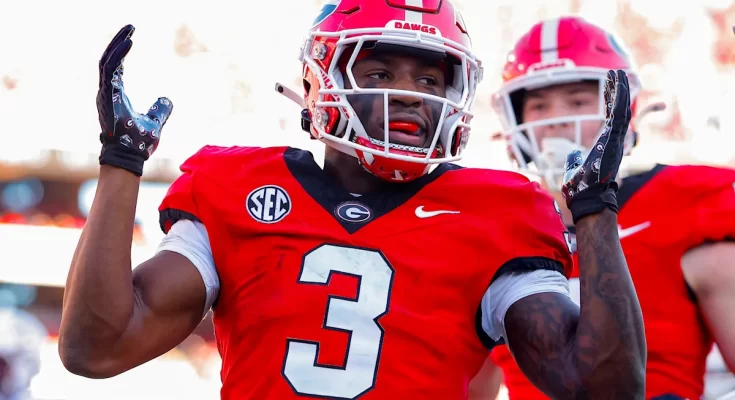When Four-Star Recruits Commit in Quick Succession Over Four, Georgia Football Gains Momentum
In the competitive landscape of college football recruiting, the rate at which top-tier talent commits to a program can significantly influence the trajectory of a team’s success. For the Georgia Bulldogs, a powerhouse in the Southeastern Conference (SEC) and national college football, the rapid commitment of multiple four-star recruits in quick succession sends ripples of momentum that impact not just the team’s immediate recruiting class but the entire program’s future outlook. Understanding how these quick, consecutive commitments from high-caliber recruits translate into momentum requires examining the psychological, strategic, and operational dimensions of recruiting as well as the broader implications for team performance, fan engagement, and program prestige.
Recruiting services such as 247Sports, Rivals, and ESPN use star ratings to quantify talent, potential, and readiness to perform at the collegiate level. Four-star recruits consistently rank within the top 300 or so nationally, demonstrating the type of skill set, athleticism, and character that college coaches covet. When multiple four-star commits arrive in quick succession, it signals to everyone involved — coaches, fans, media, and future prospects — that the program is an attractive destination brimming with opportunity.
Momentum is often described in sports as an intangible force that drives a team’s confidence and performance. In recruiting, momentum manifests as a growing buzz or positive perception surrounding a program’s ability to attract talent. When four or more four-star recruits commit in a short timeframe, that momentum builds on several levels:
1. Confidence Within the Program: Coaching staff gain renewed energy and belief that their message is resonating with top prospects. It validates recruiting strategies, on-campus visits, and game-day experiences designed to showcase the program’s strengths.
2. Recruiting Cascade Effect: Quick commitments send a strong signal to other recruits who may be on the fence. Seeing peers choose Georgia over other programs often encourages undecided players to follow suit, increasing the likelihood of further commitments.
3. Media Attention: The media narrative shifts, highlighting Georgia as a dominant recruiter, which amplifies national awareness. Positive press boosts the program’s brand and makes it a hotter topic on social media and recruiting outlets.
4. Fanbase Engagement: Momentum excites the fanbase, driving ticket sales, merchandise purchases, and social media interaction. An energized fanbase supports the team both on and off the field, adding pressure on opposing teams and coaches.
Under head coach Kirby Smart, Georgia’s recruiting philosophy emphasizes speed, physicality, and character. Smart, a former Alabama defensive coordinator, has brought an SEC-level intensity and structure to Georgia’s recruiting that demands early commitments and strong relationships with high school coaches.
The coaching staff aggressively identifies targets and works tirelessly to secure commitments early in the recruiting cycle. When four or more four-star recruits commit in quick succession, it reflects the efficiency and effectiveness of this approach. It also gives the staff time to pivot to other recruits and build contingency plans if other prospects decide elsewhere.
Momentum helps maintain a positive recruiting environment internally. Staff morale rises, leading to better preparation and more personalized recruiting efforts, ultimately creating a virtuous cycle that sustains Georgia’s ability to attract elite talent.
Looking historically, programs that maintain a steady stream of rapid commitments from top recruits often see sustained success. For Georgia, the 2020 and 2021 recruiting cycles exemplify how momentum is built and maintained.
In 2020, early commitments from multiple four-star athletes, including standout offensive and defensive players, set the tone for Georgia’s eventual No. 1 recruiting class. This early momentum helped attract additional five-star and four-star prospects who wanted to be part of a championship-caliber team.
Similarly, the 2021 class saw several quick commitments in February and March, generating buzz and optimism that echoed throughout the SEC. This momentum reinforced Georgia’s standing as a perennial contender, which helped lock in recruits who might have otherwise considered programs like Alabama, Clemson, or Ohio State.
Momentum from quick recruit commitments doesn’t just impact recruiting itself — it trickles down to the broader football program and university community.
On-Field Performance: An influx of talented four-star recruits provides depth, improves competition in practice, and fosters a winning culture. Coaches can rotate fresh talent to keep starters healthy and mitigate injuries, contributing to sustained success across the season.
Coaching Stability: When recruits commit early and frequently, it reduces stress on the coaching staff and allows for a clearer developmental plan. Stability in coaching often leads to better player retention and improved team cohesion.
University and Athletic Department: A successful football program driven by strong recruiting increases donations, sponsorships, and ticket revenue. The university benefits from enhanced national exposure, which can lead to increased applications and improved academic profile.
Georgia’s momentum-building through rapid commitments can be compared to other elite programs like Alabama, Clemson, and Ohio State. While Alabama’s dominance has often been tied to consistently landing five-star recruits, Georgia’s approach has been to build a deep, balanced roster with many four-star athletes.
This strategy of securing several four-star commitments quickly provides a different kind of momentum — one of stability and depth rather than flash. It allows Georgia to compete in multiple position groups simultaneously and creates a culture of competition within the roster.
Programs that fail to generate this quick momentum often find themselves playing catch-up, scrambling late in the recruiting cycle for leftovers or settling for less ideal fits. Georgia’s ability to consistently flip or lock down four-star recruits early puts them in the driver’s seat annually.
In today’s digital age, momentum is amplified by social media platforms where announcements, highlights, and player endorsements spread instantly. Georgia football’s recruiting staff and current players actively promote new commitments, creating viral content that energizes fans and prospects alike.
Highlight reels of newly committed recruits training, campus visits, and coaching meetings build hype around each commitment, making it feel like a communal victory. Recruits also share their commitment announcements across platforms, adding authenticity and peer influence that accelerates momentum further.
While quick succession commitments have many advantages, there are inherent risks to this approach. Coaches must balance the desire to build momentum with ensuring recruits are genuinely interested and a good fit for the program.
Hasty commitments can sometimes lead to decommitments or transfers if recruits feel rushed or misled. Maintaining strong relationships and transparent communication is essential to ensure momentum does not turn into instability.
Additionally, focusing too much on early momentum can blind staff to late-emerging talent or undervalue prospects who bloom later. Programs must remain flexible and vigilant throughout the recruiting cycle.
To sustain momentum created by quick commitments of four-star recruits, Georgia must continue investing in:
- Relationship Building: Long-term connections with recruits, families, and high school coaches ensure the program remains a trusted destination.
- Player Development: Showing recruits a clear path to growth and playing time motivates early commitments.
- Program Success: Winning championships and competing for national titles makes future recruits eager to join.
- Innovative Recruiting: Utilizing analytics, digital tools, and personalized engagement will keep Georgia ahead of the competition.
When four-star recruits commit in quick succession, Georgia football experiences a surge of momentum that transcends mere numbers. It energizes coaches, attracts undecided prospects, engages fans, and strengthens the overall program infrastructure. This momentum is a key component of Georgia’s rise as a dominant force in college football and reflects a well-executed recruiting strategy under Kirby Smart.
As the Bulldogs continue to build on this momentum, their sustained success on the field and in the recruiting arena will keep them at the forefront of college football, challenging traditional powerhouses and inspiring the next generation of elite athletes to commit to Athens, Georgia.



